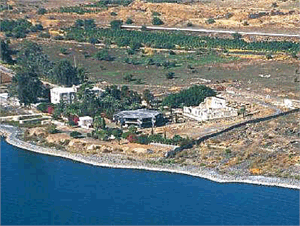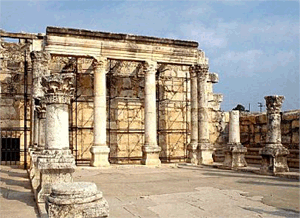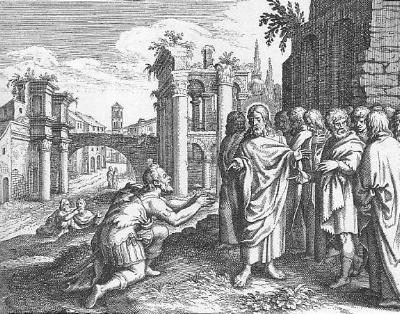
Christmas
Easter
Pentcoest
All Saints
Christ The King
Confirmation
Palm/Passion
Reformation
Stewardship
Books of the Bible
Lenten Series
Christmas Dramas
Videos
Series A - Matthew
Series B - Mark
Series C - Luke
Series D - Other
To contact
Edward F. Markquart
info@sfs.com

Series C Luke 7:1-10 SYNOPSIS OF THE FOUR GOSPELS, Kurt Aland, English Edition, p. 73-74. This Bible study is from THE LIFE OF CHRIST: A Study in the Four Gospels. This free 54 week course for the laity will be available for congregations beginning in 2007. #85. The Centurian Of Capernaum This is a story of deep, simple faith of an outsider. We will primarily study Luke’s version of the story, with its parallels in Matthew. Mark does not have a parallel to this story about the centurion’s slave being healed. John has a parallel story, but with a slightly different message and slightly different minutia in his version. Once again, we will closely study the text of the story in order to discover the message, the meaning and the minutia. That is, we are always looking for what we perceive to be the original message of the text. We also look for the meaning of this Biblical text for our lives today. As we examine the text for its’ message and meaning, we also examine the minutia and details of the text. The minutia may assist us in helping to grasp the message and meaning. The minutia is never an end in itself but is to assist in finding the message and meaning for our lives. -After Jesus had finished all his sayings in the hearing of the people, (only Luke) Jesus has finished his teachings/sayings in the Sermon on the Mount. -He entered Capernaum. “Capernaum, centurion, servant/slave.” Circle those three words in Luke and Matthew. “Capernaum.” We remember our pictures of Capernaum from a past lesson. Jesus lived in Capernaum and it was his hometown in adulthood. The two sets of brothers (Peter and Andrew; James and John) who became disciples also lived in Capernaum. Capernaum was located on the north edge of the Sea of Galilee or Lake Galilee, and that lake is a large body of water, thirteen miles long and seven miles wide. The village of Capernaum existed for about eight hundred years, from the 200 BCE to 600 CE. This village was built along the edge of the Sea of Galilee and had up to 1500 residents. http://www.christiananswers.net/bibleplaces/home.html
-A centurion there had a slave whom he valued highly, and who was ill and close to death. “Centurion.” In the New Testament, there are twenty-one references to a centurion, who was a commander in the Roman army. All twenty-one references are positive. There are two primary stories about a centurion in the gospels: here in Matthew and Luke which tell of the simple and great faith of the centurion and at the end of the gospels where we hear the story of the centurion at Jesus’ crucifixion. There are several other positive stories about centurions in the Book of Acts. A centurion was a commander of a century (one hundred men) and there were sixty centuries (six thousand men) in a Roman legion. “Servant/slave.” It needs to be remembered that the Greek word, “doulos,” can be translated servant or slave. The servant or a slave is the property of his owner. A slave does not have any legal rights. Luke tells us this slave was important to the centurion, and this was a positive quality of the centurion, to have feelings of affection and closeness for his slave. We also hear that this slave was very sick, near death, and was paralyzed. By this brief description in this gospel story, we begin to draw the conclusion that the centurion was a good man. We also examine John’s version of the same story. John’s version of the story says: “Capernaum, an official (not a centurion), whose son (not a slave) was ill.” Circle the word, “son.” The details of the story vary between Matthew/Luke’s version of the incident and John’s. Yet the message and meaning of the story is similar. Notice that Aland, the author of this text, THE SYNOPSIS OF THE FOUR GOSPELS, suggests that this is the same story but with two versions. Previously, we have emphasized that each gospel writer is unique and records what he heard from his own perspective. The differences of details in the two accounts of the story are not troublesome for us but illustrate the human uniqueness of each writer. -When he heard about Jesus, he sent some Jewish elders to him, asking him to come and heal his slave. Here is a description of a simple but devout and deep faith in Jesus. The Roman centurion had heard of Jesus’ healings and asked, “Just come, Jesus, and my servant will be healed.” He believed in the power of God in Jesus. Luke records having Jewish elders present and interceding for him; Matthew does not. -When they came to Jesus, they appealed to him earnestly, saying, "He is worthy of having you do this for him, for he loves our people, and it is he who built our synagogue for us."
Underline these words in the text: “The centurion is worthy for he loves our nation and he built our synagogue for us.” That the centurion loved the Jewish race says much about this centurion. This centurion was part of an occupational army, yet he loved the Jews. He also built the synagogue for them. The above picture is a photograph that we saw in a previous lesson. The walls of the synagogue are not the original walls from the time of Jesus, but the foundation stones beneath this synagogue are from the first century. We rightfully assume that the location of the synagogue has not changed and the foundation stones beneath this synagogue are from the synagogue of Jesus’ day. -And Jesus went with them, but when he was not far from the house, the centurion sent friends to say to him, -"Lord, do not trouble yourself, for I am not worthy to have you come under my roof; therefore I did not presume to come to you. This centurian knew the truth about himself and Jesus; that he, the centurian was not nearly as good, honorable and pure as Jesus was. He felt that he was unworthy to have Jesus come into his home. As significantly flawed human beings, we often feel that way about ourselves in the presence of the Living God. We think to ourselves: "Who are we to ask for God's help, knowing how sinful and selfish we have been with our lives." -But only speak the word, and let my servant be healed. “Say the word and let my servant be healed.” Underline. The centurion believed in the power of God living in Jesus. In other words, he believed in Christ and his power to heal. This centurian had deep and authentic faith, a faith that most of us Christians would like to have. Notice the perfectly literal parallel between Matthew and Luke’s account for fourteen lines, from “say the Word” to “not even in Israel I have found such faith.” As we have said previously, it appears that Matthew and Luke are copying from an earlier document and sometimes, the two Biblical authors precisely copy the exact same words. As we have said previously, scholars label this earlier document by the name of “Q” or Quella, the German word for Source. Q is a hypothetical, ancient source document. Sometimes, Matthew and Luke copy the exact words from Q; sometimes the two authors do not copy the exact words but copy a progression of ideas or concepts. “Truly I say to you” (Matthew) and “I tell you” (Luke). This is a small but subtle and persistent difference between the Jewishness of Matthew’s gospel and the Gentileness of Luke’s gospel. Matthew, with his Jewish (or Aramaic style) says, “Truly I say to you.” Luke, writing to a worldwide audience that is not primarily Jewish, simply says, “I tell you.” “Truly” or “Amen” was a Jewish word that was used often within Jewish communities. -For I also am a man set under authority, with soldiers under me; and I say to one, "Go,' and he goes, and to another, "Come,' and he comes, and to my slave, "Do this,' and the slave does it." This centurian had soldiers and slaves under his command. People knew who was "boss" and "called the shots." In other words, here was a man who had power and authority...but in this particular moment, his power and authority could not command for his slave to be healed. We, people, are often in a similar situation. We have power, authority, money and other resources but we still don't have "that something" to heal our mother, father, son, daughter, marriage, nation, world, the ethnic violence all around our globe. We then coming begging to the Lord for healing of a problem that we don't have the power, authority and resources to heal. We are often reduced to being beggars, on our emotional and spiritual knees, pleading with the Lord God to intervene and save our loved one from disease and/or our world from ethnic and religious violence. -When Jesus heard this he was amazed at him, and turning to the crowd that followed him, he said, "I tell you, not even in Israel have I found such faith." “Not even in Israel, I have found such faith.” Highlight. This is the key to the story. The key to the story is that a Roman soldier, not educated in Jewish history or worship practices, had genuine faith, even without the Law, even without the Old Testament, even without the worship rituals of the Jewish religion. Or, if you think about it and the parallels with Christianity, this centurion did not have a creedal faith in Jesus Christ that could recite the Apostles Creed. He didn’t have a dogmatic faith that believed in the basic doctrines about Christ that Christ was true God and true man. He simply believed in Jesus and the power of God living inside of Jesus to heal. …. Sometimes, and often, I believe that our narrower definitions of genuine faith need to be broadened and expanded to include others outside of our humanly interpreted boundaries as to who is inside and outside the circle of faith. -When those who had been sent returned to the house, they found the slave in good health The following paragraphs are from a sermon I preached on this text:
(Here ends this section of that sermon.) Painting and Imagination: http://home.halden.net/rolf/merian/m151.jpg
Let’s briefly examine John’s version of the story. In John, we have an official and not a centurion. We have a son, and not a slave. Jesus suggests that the public official is looking for signs and wonders in order to believe, but the public official simply believes. Jesus promises the official that his son will live and the man believed the word that Jesus spoke to him. In other words, faith is believing the words that Jesus speaks to us. Faith is trusting that the promises(s) that Jesus makes to us are true…without any signs, without any wonders, without any miracles. Then it was discovered that the son was healed at 1:00 in the afternoon, exactly at the time that Jesus had spoken his word of promise to the official. Understanding this, the official believed. For John, this is the second sign that Jesus did, the first sign being the turning of the water into wine at Cana. What is the message of this sign? True faith is to believe in the promises of Jesus, before signs, before wonders, and before miracles. What is the meaning for our lives today? We too are to believe in the promises of Christ…that our sins are forgiven, that Jesus is life, that Jesus promises eternal life, that Christ is the way to God and the truth about God. Faith is believing the promises of God to us …before any sign is given. |
|




